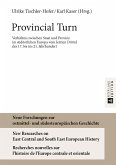The Thousand Families by Ali Shabani, former court journalist and writer under Mohammad Reza Shah, is a lively and entertaining anecdotal history of the Qajar family, who ruled Iran from 1796 to 1925, as well as a number of their associates. Using memoirs, diaries, government documents, and nineteenth century histories, the author paints a vivid picture of the strengths and weaknesses, character and habits, and family backgrounds and familial legacies of the leading figures of the day. He comments, often ironically and with novel metaphors and sometimes biting criticism, on the behavior of these leaders, and he provides concise observations concerning the effects of their actions on the country and people of Iran. He outlines as well the policies and practices of the Qajars with respect to governance and traces the changes effected in the overall governmental structure of Iran during the nineteenth and early twentieth century. The gradually increasing influence of foreign powers (primarily Great Britain and Russia) throughout this era does not escape the author's acerbic comments. Appendices provide extensive documentation on kinship relationships within the royal family.
The translators have added notes, bracketed in the text and in footnotes, to help orient readers less familiar with Iranian history than the author's original audience. These include key dates, more detail on sources (when available), reference to easily accessible additional information on key figures, and explanations of selected Persian sayings, customs, and practices.
Scholars and students of Iran, the Middle East, and the nineteenth century in general will find this book of interest, as will the general reader interested in royalty, political systems, revolution, and center-periphery relationships.
The translators have added notes, bracketed in the text and in footnotes, to help orient readers less familiar with Iranian history than the author's original audience. These include key dates, more detail on sources (when available), reference to easily accessible additional information on key figures, and explanations of selected Persian sayings, customs, and practices.
Scholars and students of Iran, the Middle East, and the nineteenth century in general will find this book of interest, as will the general reader interested in royalty, political systems, revolution, and center-periphery relationships.
"The Thousand Families, despite its deceptively populist title, is an excellent work of historical scholarship on a misunderstood period of Iranian and world history. With insights into the sources and a deep understanding of the dynamics of the inner workings of the Qajar court, Ali Shabani has produced a remarkable book whose periodization of Qajar administrative history is an excellent starting point for any study of nineteenth century Iranian history."-Khodadad Rezakhani, Department of History, Princeton University









